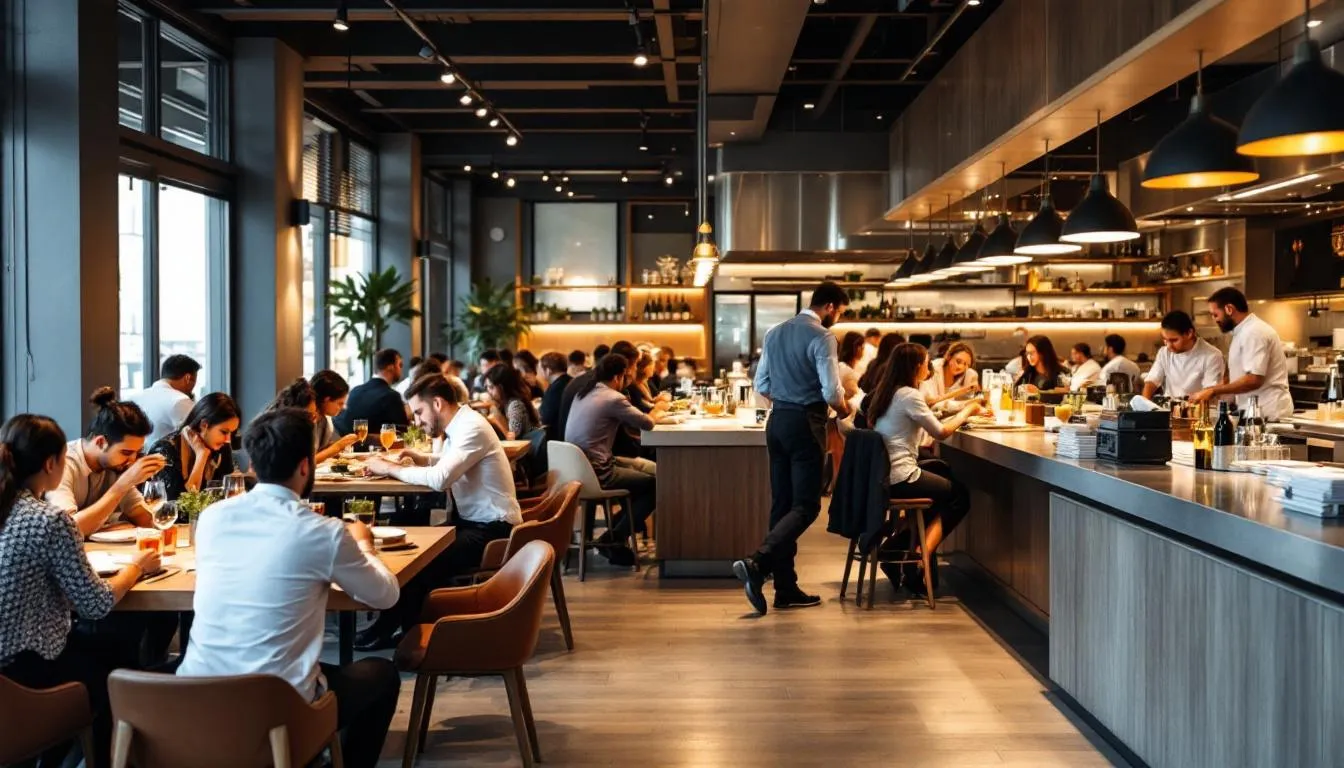What are Restaurant Business Loans?
Restaurant business loans are financing solutions designed to help restaurant owners cover expenses, manage cash flow, and invest in growth. From purchasing equipment to hiring new staff, loans provide the capital needed to keep operations running smoothly.
Restaurant loans can help secure funding for various business needs, including equipment upgrades, payroll, inventory, and emergency spending. Restaurant financing could help you grow your restaurant business. Restaurant owners often need extra funding to prepare for the upcoming season.
Whether you’re running a small café or a large dining establishment, the right loan program can make all the difference in sustaining profitability and success.
How do Restaurant Business Loans work?
Restaurant business loans work by providing access to capital that must be repaid over time, typically with interest. Depending on the financing option, repayment terms, fees, and eligibility requirements can vary. Some loans work like traditional bank products, while others are offered by online and alternative lenders with faster approval processes.
Here are the most common types of restaurant financing:
Equipment Financing
Restaurant equipment financing helps restaurant owners acquire new equipment without heavy upfront costs. Restaurant owners can use equipment loans specifically to cover the cost of equipment purchases. Equipment loans typically have fixed interest rates, allowing for predictable payments. Repayment terms for equipment loans can span up to three years, depending on the equipment’s lifespan.
This financing option makes the most sense for owners who need to upgrade appliances, repair equipment, or invest in modern tools that keep operations efficient.
Business Term Loans
Business term loans provide restaurants with a lump sum of capital repaid over set repayment terms. They can be used for real estate, renovations, or other significant expenses. Term loans often come with fixed interest rates and structured repayment plans, making them suitable for long-term financing.
Business Line of Credit
Restaurant owners may open a business line of credit to access funds as needed up to a certain credit limit. A line of credit provides flexibility for ongoing expenses like payroll, inventory, or emergency cash flow needs. With a business line of credit, you only pay interest on the funds you use, making it a convenient and cost-saving option for the restaurant industry.
Working Capital Loan
Working capital loans are designed to help restaurants cover short-term expenses, such as payroll, rent, or supplier invoices. Alternative small business funding can help meet the unique challenges of running a restaurant, especially when revenue fluctuates.
Merchant Cash Advance
Merchant cash advances used to provide funds based only on a percentage of future credit card sales. However, MCAs now use all revenue as a basis for funding amounts. Restaurants with steady credit card volume but limited access to traditional loans often used this option.
Revenue-Based Business Loan
Revenue based business loans provide funding tied to your restaurant’s monthly revenue. Restaurant funding rates depend on the type of alternative small business funding received, and payments fluctuate with sales performance.
SBA Loans
Restaurant owners could try to qualify for a U.S. Small Business Administration loan or SBA loan through their bank or preferred lender. SBA loans are similar to traditional loans, with the SBA guaranteeing them. The SBA guarantees up to 85% for loans of up to $150,000 and 75% for loans greater than $150,000. The SBA 7(a) loan is the most popular type of SBA loan and is available for up to $5 million.
Online lenders may offer faster application processes compared to traditional lenders. SBA loans are attractive because of lower interest rates and longer repayment terms.
What are the qualifications for a Restaurant Business Loan?
Exact qualification requirements for restaurant funding depend on the type of funding being sought. Traditional lenders typically consider restaurants to be one of the riskiest ventures. Most traditional banks consider restaurants to be high-risk and will not fund them. The approval process for conventional loans can take weeks or months for restaurant owners.
Alternative lenders have more flexible approval requirements than traditional banks. Online lending offers quicker application processes than conventional lenders. Approval for restaurant funding from alternative lenders often does not rely solely on credit score.
Instead, they may consider your cash flow, revenue history, or overall business health when determining eligibility requirements.
How to Apply for a Restaurant Business Loan:
The application process may be slightly longer or shorter for different types of loans. However, all variations require very little paperwork, and you can get funded in just a few business days. Here’s how to get started:
Step 1: Choose Your Working Capital Loan
We usually recommend the loan options that feature the most uncomplicated repayment terms for your cash flow. This depends on the length of your cash flow gap and how quickly you can pay off the loan.
Step 2: Gather Your Documents
This step depends on the type of loan options you’re applying for. Here are the documents and information you may need to get started for each option:
- Voided business check
- Bank statements (3 Months)
- Drivers license
Step 3: Fill Out Application
You can begin the application process by calling us or filling out our one-page online application. Either way, you’ll be asked to enter the information from the previous section along with your desired funding amount.
Step 4: Speak to a Representative
Once you apply, a representative will contact you to explain the repayment terms, rates, and terms of your available options. This way, you won’t have to worry about any surprises or hidden fees from lenders during repayment.
Step 5: Receive Approval
For most loan products, credit approval only takes a few days. Depending on the type of loan, funds should appear in your bank account in 1-3 business days for most funding options.
What are the benefits of Restaurant Business Loans?
Restaurant business loans provide essential capital to handle unexpected expenses, manage cash flow, and fuel growth. They allow restaurant owners to repair equipment, purchase inventory, hire staff, or expand operations without draining reserves.
Access to financing also helps restaurants remain competitive by investing in marketing, customer experience, and modern technology. With multiple financing options available, restaurant owners can find the loan program that makes the most sense for their business needs and repayment capacity.
What are the drawbacks of Restaurant Business Loans?
While restaurant business loans offer many benefits, they also come with challenges. Interest rates may be higher for restaurants due to their high-risk classification. Repayment terms and fees can vary, making it difficult to determine the best financing option without thorough research.
Additionally, traditional loans often require extensive documentation, a strong balance sheet, and collateral, which many restaurants may not have. Borrowers should also be mindful that taking on too much debt can put additional strain on already thin profit margins.
Restaurant Business Loan Pros & Cons
Pros:
- Access to capital for equipment, payroll, and expansion
- Flexible financing options are available through alternative lenders
- Can improve cash flow during seasonal slowdowns
- SBA-backed loans offer lower interest rates and long-term financing
Cons:
- Many restaurants are considered high risk by lenders
- The approval process for traditional loans can be lengthy
- Some financing options come with higher fees or variable repayment terms
- Debt repayment can pressure already tight margins
Frequently Asked Questions
Here are the most common questions about restaurant business loans.
What challenges do Restaurant Businesses face?
Being in the restaurant industry isn’t easy due to high overhead and operating costs. Many restaurants are seasonal businesses where revenue fluctuates throughout the year. Traditional lenders often consider restaurants to be high-risk ventures.
Other challenges include high staff turnover, increasing food and labor costs, changing consumer preferences, and intense competition for customers.
Top reasons restaurants fail:
- Poor cash flow management
- High operating expenses
- Insufficient working capital
- Failure to attract and retain customers
- Lack of a clear marketing strategy
Can Restaurants get SBA Loans?
Restaurant owners could try to qualify for a U.S. Small Business Administration loan or SBA loan through their bank or preferred lender. The approval process for SBA loans could take months. Applicants may be asked to provide a range of documents, such as financial statements and business plans.
SBA loans are similar to traditional loans, with the SBA guaranteeing them. The SBA 7(a) loan is a versatile option designed to provide necessary capital for your small business. To qualify for an SBA 7(a) loan, a restaurateur must meet specific criteria, such as having reasonable equity to invest. The turnaround time for the SBA 7(a) loan is typically 2-3 weeks, depending on the lender.
Individual lenders may also have specific requirements, such as minimum credit scores. Certain banks are considered SBA Preferred Lenders and have proven track records of providing small businesses with SBA-backed loans. SBA loan applicants must be a for-profit business.
What can I use Restaurant Business Loan Funds for?
Restaurant business loans are versatile and can be applied to nearly any business need. Upgrading restaurant equipment can improve operational efficiency and enhance service quality. Business owners might use a restaurant loan to upgrade or repair equipment. Restaurant owners might use small business loans to help grow their business. A restaurant loan could help fill gaps in cash flow.
Alternative funding can provide the necessary working capital for seasonal fluctuations in restaurant revenue. Funds from equipment financing can be used to purchase or lease new appliances and upgrade existing machinery.
How can I compete in the Restaurant Industry?
To compete in today’s restaurant industry, owners must balance customer service, food quality, and efficient operations. Funding can support key initiatives, but strategy plays an equally important role.
Alternative funding can be used for marketing efforts to increase brand awareness for restaurants. Well-maintained and modern kitchen equipment increases productivity and reduces operating costs. Hiring skilled staff, investing in online ordering systems, and offering delivery services are also ways to attract more customers.
Are there Bad Credit Business Loans for Restaurants?
Having bad credit doesn’t mean you can’t access financing. Several online lenders specialize in bad credit business loans. Alternative funding options can cater to restaurants with lower credit scores.
Alternative lenders may analyze the overall health of a restaurant when considering funding. This flexibility allows more restaurant owners to get the capital they need—even if traditional banks won’t approve them.
Restaurant Business Loans – Final Thoughts
The restaurant industry is one of the most competitive and high-risk sectors, but it’s also full of opportunity for those who can adapt and grow. Restaurant business loans provide vital support for covering expenses, managing cash flow, and seizing growth opportunities. From SBA-backed loans to merchant cash advances, there are financing options that fit the unique needs of every restaurant business.
By understanding the eligibility requirements, repayment terms, and benefits of each loan program, restaurant owners can determine which financing option makes the most sense for their situation. Whether you need short-term working capital, long-term financing for real estate, or equipment upgrades to improve service, there’s a loan option available to help your restaurant succeed.
Contact us if you have more questions about restaurant financing options or to apply for a small business loan. Our alternative financing experts can help you find the best small business loans for your restaurant goals.












